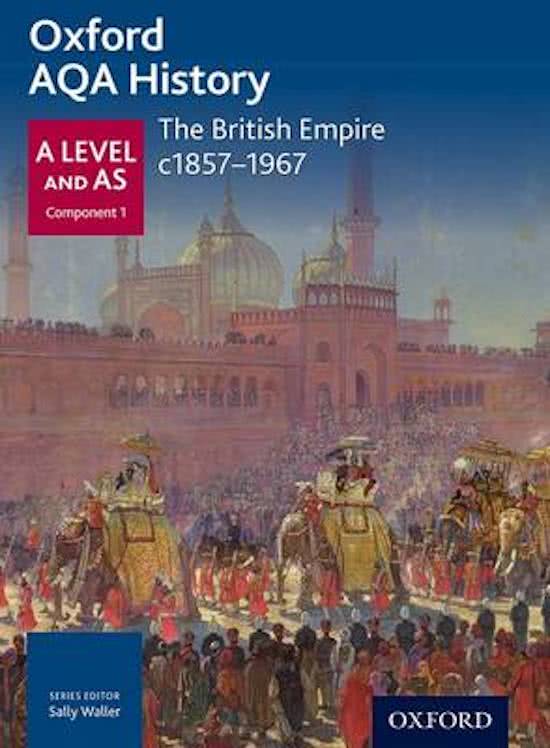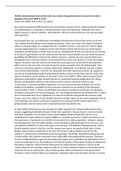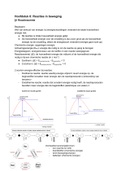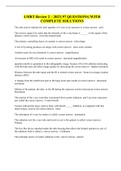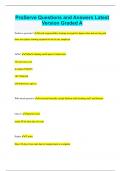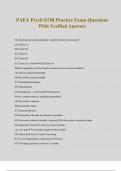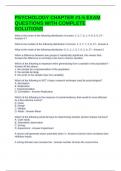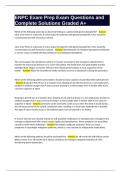‘British administrators were driven more by a sense of superiority than by concern for native
peoples in the years 1890 to 1914.’
Assess the validity of this view. (25 marks)
Any reforms during the British Empire were not genuine concerns for the native people but masked
overwhelmingly by an attempt to maintain political and racial superiority. Although there was a
slight increase in cultural sensitivity, administrators still were powered by their own personal gain
and superiority.
Racial superiority was overwhelming in how British administrators viewed the natives as second-
class citizens and that Britain would always be superior. There were only a few limited, beneficial
reforms in Baring’s Egypt- for example the rise in modern tourism. In the early 20 th century Egypt
oversaw rapid expansion in modern tourism and Thomas Cook & Son became one of the largest
employers, providing jobs in hotels and excursions. Subsequently, British rule did lead to an increase
in economic opportunities for the native people therefore administration was not solely focused on
benefitting the British but caring for the natives. However, tourism was only concentrated in key
developed areas so tourists wouldn’t be shocked by the poverty and squalor of certain developing
regions- therefore here the reforms are pinned by racial superiority as the British administrators
didn’t care to even show the real state of Egypt to garner sympathy from the British public. Their
sole focus was driven largely to maintain superiority. Additionally, Cecil Rhodes was also a highly
controversial administrator, noted for his imperialist and white supremacist ideals. His supporters
saw him as having brought political and physical infrastructure to South Africa. But the critics now
point to his time as prime minister of the Cape Colony, from 1890 to 1896, when his government
effectively restricted the rights of black Africans by raising the financial qualifications for voting.
Rhodes confining black Africans to the bottom of the economic hierarchy shows he was
concentrated on preserving British superiority. He was controversial back in Britain even at the
height of his influence. Arguably his most notorious moment was his backing of the disastrous
Jameson Raid of 1895, in which a small British force tried to overthrow Paul Kruger, the Afrikaner
president of the gold-rich Transvaal Republic. The raid helped prompt the Second Boer War, in which
tens of thousands died; this is significant as it shows how Rhodes disregarded the excessive high
human cost of the natives. Clearly, Rhodes showed very little regard for the native population due to
racist ideology and instead cared about acquiring more personal wealth. Racial superiority is
predominately why the natives didn’t drastically benefit from British rule.
In India, British administrators also showed very little regard for the cultural wishes of the native
people, suggesting the British believed in their own superiority. Viceroy Curzon’s rule was chaotic
and led to instability. On one hand, Curzon acknowledged the growing British criticism as he
established the Indian National Congress (1885) as a symbolic gesture for middle class Indians to air
their grievances- showing he was mindful of demands for the native population. However, despite
the dissatisfaction from the Indian people, Curzon decided to split up Bengal for his own ease as it
was deemed ineffective to rule as the region was too large. The partition of Bengal would create a
Muslim majority sector in the East, and this caused mass uproar among the Hindu elite of West
Bengal, many of whom owned last in the East. The Curzon’s lack of respect and care for the
majority’s concerns led to anti-British sentiments growing. The Hindus boycotted British goods and
created strikes- the Swadeshi movement were nationalists who organised key protests. Therefore,
Curzon prioritised British superiority (by keeping the region more profitable and administered more
easily by sectioning it) over the traditional and cultural customs of the natives leading to widespread
discontent. However, Viceroy Morley Minto gave the Indians genuine reforms in favour of the
native’s interests. For example, Indian Councils Act of 1909 enabled 27 Indians to be elected and to
assist the Viceroy in making laws- this provided greater Indian participation in the government.
Therefore, Viceroy Morley Minto was looking for authentic native representation and thus it cannot
peoples in the years 1890 to 1914.’
Assess the validity of this view. (25 marks)
Any reforms during the British Empire were not genuine concerns for the native people but masked
overwhelmingly by an attempt to maintain political and racial superiority. Although there was a
slight increase in cultural sensitivity, administrators still were powered by their own personal gain
and superiority.
Racial superiority was overwhelming in how British administrators viewed the natives as second-
class citizens and that Britain would always be superior. There were only a few limited, beneficial
reforms in Baring’s Egypt- for example the rise in modern tourism. In the early 20 th century Egypt
oversaw rapid expansion in modern tourism and Thomas Cook & Son became one of the largest
employers, providing jobs in hotels and excursions. Subsequently, British rule did lead to an increase
in economic opportunities for the native people therefore administration was not solely focused on
benefitting the British but caring for the natives. However, tourism was only concentrated in key
developed areas so tourists wouldn’t be shocked by the poverty and squalor of certain developing
regions- therefore here the reforms are pinned by racial superiority as the British administrators
didn’t care to even show the real state of Egypt to garner sympathy from the British public. Their
sole focus was driven largely to maintain superiority. Additionally, Cecil Rhodes was also a highly
controversial administrator, noted for his imperialist and white supremacist ideals. His supporters
saw him as having brought political and physical infrastructure to South Africa. But the critics now
point to his time as prime minister of the Cape Colony, from 1890 to 1896, when his government
effectively restricted the rights of black Africans by raising the financial qualifications for voting.
Rhodes confining black Africans to the bottom of the economic hierarchy shows he was
concentrated on preserving British superiority. He was controversial back in Britain even at the
height of his influence. Arguably his most notorious moment was his backing of the disastrous
Jameson Raid of 1895, in which a small British force tried to overthrow Paul Kruger, the Afrikaner
president of the gold-rich Transvaal Republic. The raid helped prompt the Second Boer War, in which
tens of thousands died; this is significant as it shows how Rhodes disregarded the excessive high
human cost of the natives. Clearly, Rhodes showed very little regard for the native population due to
racist ideology and instead cared about acquiring more personal wealth. Racial superiority is
predominately why the natives didn’t drastically benefit from British rule.
In India, British administrators also showed very little regard for the cultural wishes of the native
people, suggesting the British believed in their own superiority. Viceroy Curzon’s rule was chaotic
and led to instability. On one hand, Curzon acknowledged the growing British criticism as he
established the Indian National Congress (1885) as a symbolic gesture for middle class Indians to air
their grievances- showing he was mindful of demands for the native population. However, despite
the dissatisfaction from the Indian people, Curzon decided to split up Bengal for his own ease as it
was deemed ineffective to rule as the region was too large. The partition of Bengal would create a
Muslim majority sector in the East, and this caused mass uproar among the Hindu elite of West
Bengal, many of whom owned last in the East. The Curzon’s lack of respect and care for the
majority’s concerns led to anti-British sentiments growing. The Hindus boycotted British goods and
created strikes- the Swadeshi movement were nationalists who organised key protests. Therefore,
Curzon prioritised British superiority (by keeping the region more profitable and administered more
easily by sectioning it) over the traditional and cultural customs of the natives leading to widespread
discontent. However, Viceroy Morley Minto gave the Indians genuine reforms in favour of the
native’s interests. For example, Indian Councils Act of 1909 enabled 27 Indians to be elected and to
assist the Viceroy in making laws- this provided greater Indian participation in the government.
Therefore, Viceroy Morley Minto was looking for authentic native representation and thus it cannot

